SH5004 Contemporary Issues: Social Model of Health and Diseases
VerifiedAdded on 2023/04/23
|11
|2965
|460
Essay
AI Summary
This essay critically analyzes the social model of health in contrast to the biomedical model, emphasizing the importance of social determinants in understanding and addressing diseases like diabetes. It discusses how factors such as socioeconomic status, education, access to healthcare, and stress significantly impact health outcomes. The essay highlights the limitations of the biomedical approach, which primarily focuses on biological factors, and advocates for a holistic approach that considers the broader social, environmental, and economic influences on health. It further elaborates on the principles of the social model, including addressing broader determinants, reducing social inequities, empowering individuals, improving healthcare access, and fostering inter-sectoral collaboration, to ensure comprehensive and equitable healthcare services. The essay concludes that healthcare professionals should adopt the social model to improve the quality of life and prevent disease relapse, moving beyond a purely biological perspective.
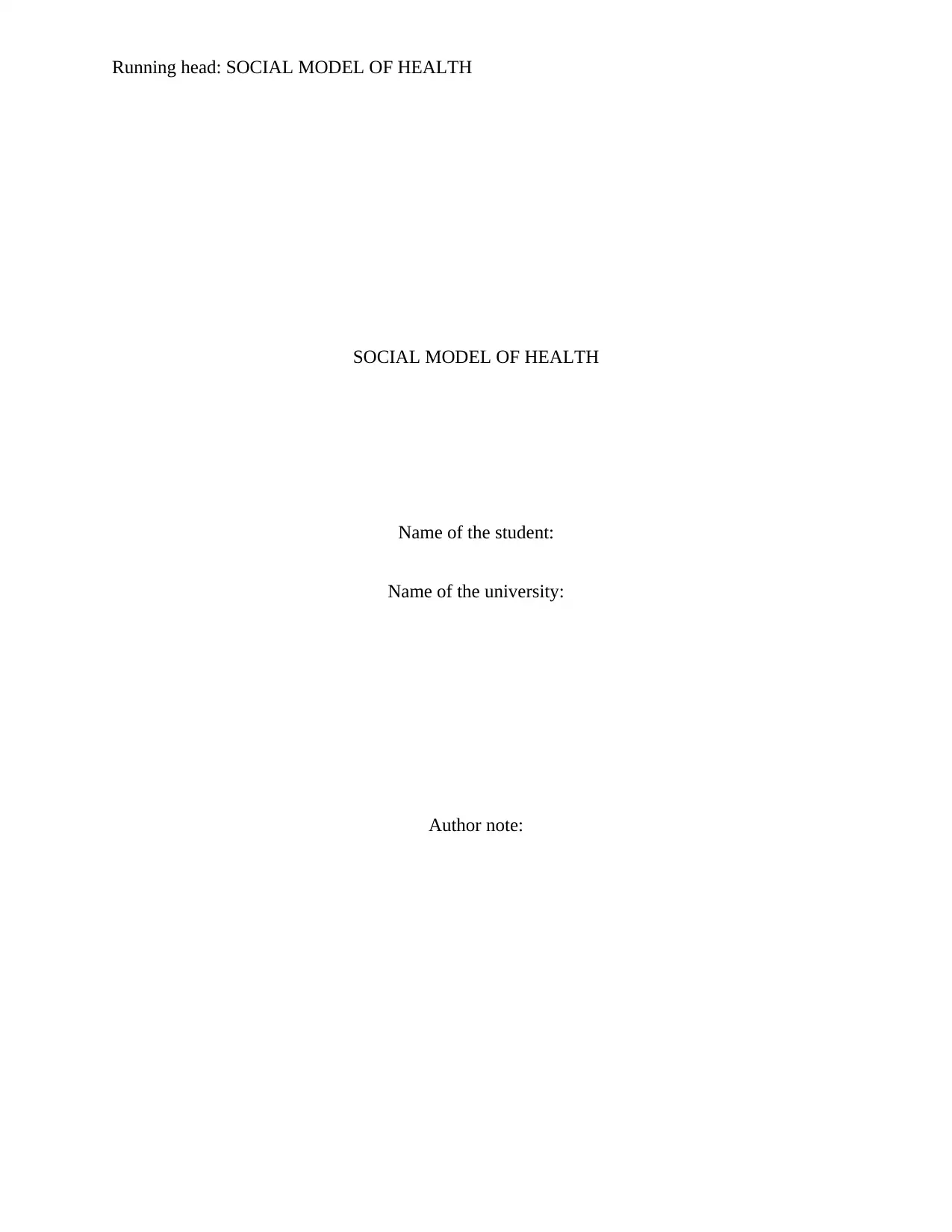
Running head: SOCIAL MODEL OF HEALTH
SOCIAL MODEL OF HEALTH
Name of the student:
Name of the university:
Author note:
SOCIAL MODEL OF HEALTH
Name of the student:
Name of the university:
Author note:
Paraphrase This Document
Need a fresh take? Get an instant paraphrase of this document with our AI Paraphraser
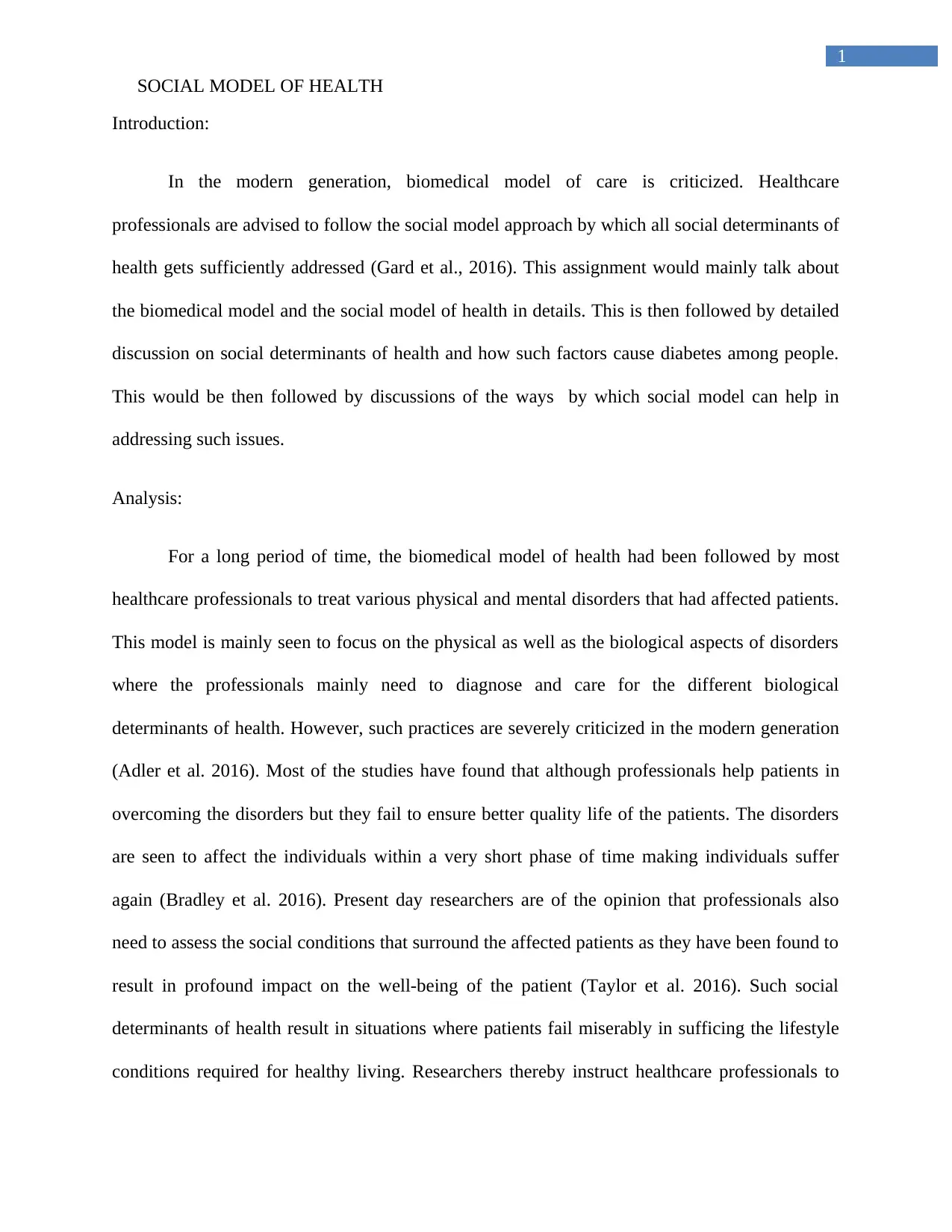
1
SOCIAL MODEL OF HEALTH
Introduction:
In the modern generation, biomedical model of care is criticized. Healthcare
professionals are advised to follow the social model approach by which all social determinants of
health gets sufficiently addressed (Gard et al., 2016). This assignment would mainly talk about
the biomedical model and the social model of health in details. This is then followed by detailed
discussion on social determinants of health and how such factors cause diabetes among people.
This would be then followed by discussions of the ways by which social model can help in
addressing such issues.
Analysis:
For a long period of time, the biomedical model of health had been followed by most
healthcare professionals to treat various physical and mental disorders that had affected patients.
This model is mainly seen to focus on the physical as well as the biological aspects of disorders
where the professionals mainly need to diagnose and care for the different biological
determinants of health. However, such practices are severely criticized in the modern generation
(Adler et al. 2016). Most of the studies have found that although professionals help patients in
overcoming the disorders but they fail to ensure better quality life of the patients. The disorders
are seen to affect the individuals within a very short phase of time making individuals suffer
again (Bradley et al. 2016). Present day researchers are of the opinion that professionals also
need to assess the social conditions that surround the affected patients as they have been found to
result in profound impact on the well-being of the patient (Taylor et al. 2016). Such social
determinants of health result in situations where patients fail miserably in sufficing the lifestyle
conditions required for healthy living. Researchers thereby instruct healthcare professionals to
SOCIAL MODEL OF HEALTH
Introduction:
In the modern generation, biomedical model of care is criticized. Healthcare
professionals are advised to follow the social model approach by which all social determinants of
health gets sufficiently addressed (Gard et al., 2016). This assignment would mainly talk about
the biomedical model and the social model of health in details. This is then followed by detailed
discussion on social determinants of health and how such factors cause diabetes among people.
This would be then followed by discussions of the ways by which social model can help in
addressing such issues.
Analysis:
For a long period of time, the biomedical model of health had been followed by most
healthcare professionals to treat various physical and mental disorders that had affected patients.
This model is mainly seen to focus on the physical as well as the biological aspects of disorders
where the professionals mainly need to diagnose and care for the different biological
determinants of health. However, such practices are severely criticized in the modern generation
(Adler et al. 2016). Most of the studies have found that although professionals help patients in
overcoming the disorders but they fail to ensure better quality life of the patients. The disorders
are seen to affect the individuals within a very short phase of time making individuals suffer
again (Bradley et al. 2016). Present day researchers are of the opinion that professionals also
need to assess the social conditions that surround the affected patients as they have been found to
result in profound impact on the well-being of the patient (Taylor et al. 2016). Such social
determinants of health result in situations where patients fail miserably in sufficing the lifestyle
conditions required for healthy living. Researchers thereby instruct healthcare professionals to
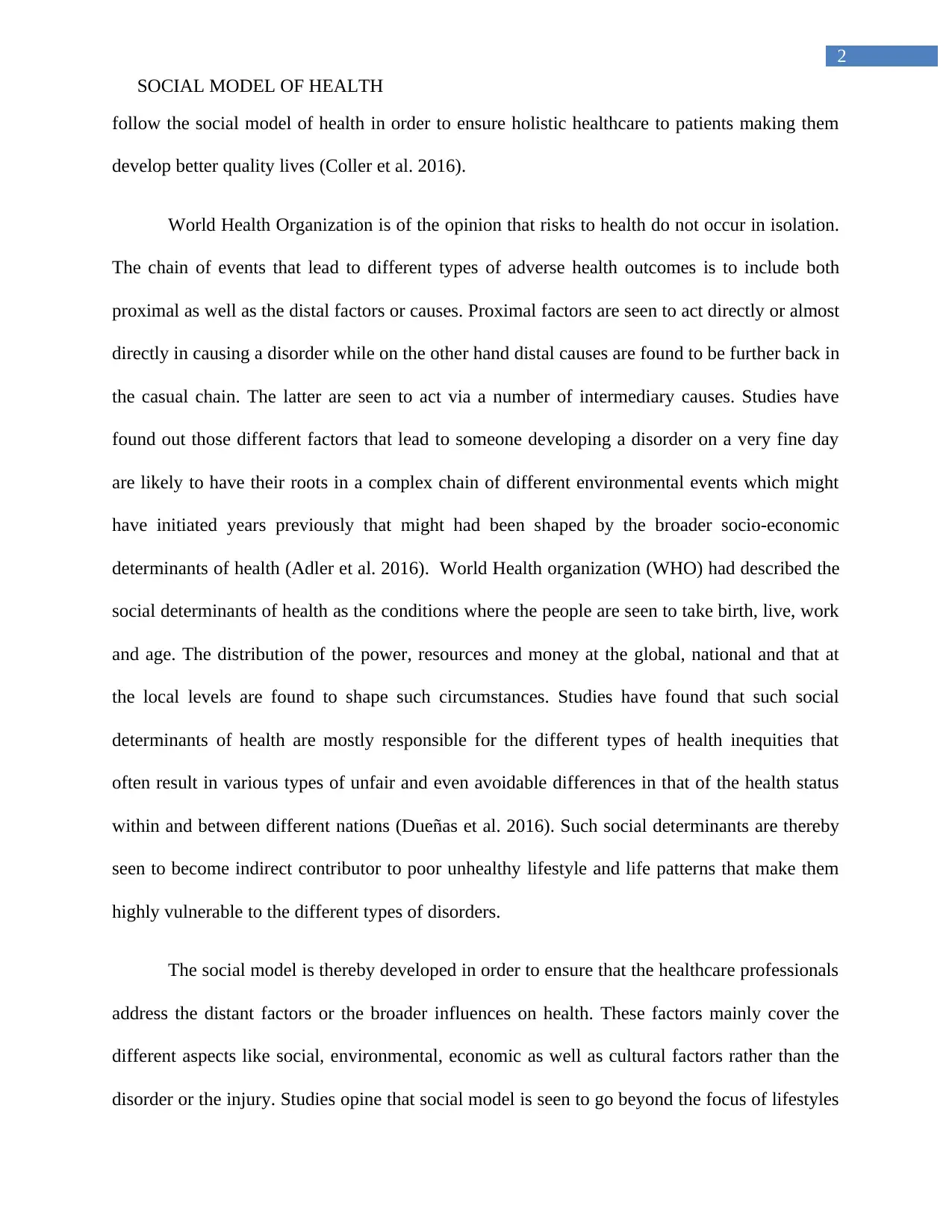
2
SOCIAL MODEL OF HEALTH
follow the social model of health in order to ensure holistic healthcare to patients making them
develop better quality lives (Coller et al. 2016).
World Health Organization is of the opinion that risks to health do not occur in isolation.
The chain of events that lead to different types of adverse health outcomes is to include both
proximal as well as the distal factors or causes. Proximal factors are seen to act directly or almost
directly in causing a disorder while on the other hand distal causes are found to be further back in
the casual chain. The latter are seen to act via a number of intermediary causes. Studies have
found out those different factors that lead to someone developing a disorder on a very fine day
are likely to have their roots in a complex chain of different environmental events which might
have initiated years previously that might had been shaped by the broader socio-economic
determinants of health (Adler et al. 2016). World Health organization (WHO) had described the
social determinants of health as the conditions where the people are seen to take birth, live, work
and age. The distribution of the power, resources and money at the global, national and that at
the local levels are found to shape such circumstances. Studies have found that such social
determinants of health are mostly responsible for the different types of health inequities that
often result in various types of unfair and even avoidable differences in that of the health status
within and between different nations (Dueñas et al. 2016). Such social determinants are thereby
seen to become indirect contributor to poor unhealthy lifestyle and life patterns that make them
highly vulnerable to the different types of disorders.
The social model is thereby developed in order to ensure that the healthcare professionals
address the distant factors or the broader influences on health. These factors mainly cover the
different aspects like social, environmental, economic as well as cultural factors rather than the
disorder or the injury. Studies opine that social model is seen to go beyond the focus of lifestyles
SOCIAL MODEL OF HEALTH
follow the social model of health in order to ensure holistic healthcare to patients making them
develop better quality lives (Coller et al. 2016).
World Health Organization is of the opinion that risks to health do not occur in isolation.
The chain of events that lead to different types of adverse health outcomes is to include both
proximal as well as the distal factors or causes. Proximal factors are seen to act directly or almost
directly in causing a disorder while on the other hand distal causes are found to be further back in
the casual chain. The latter are seen to act via a number of intermediary causes. Studies have
found out those different factors that lead to someone developing a disorder on a very fine day
are likely to have their roots in a complex chain of different environmental events which might
have initiated years previously that might had been shaped by the broader socio-economic
determinants of health (Adler et al. 2016). World Health organization (WHO) had described the
social determinants of health as the conditions where the people are seen to take birth, live, work
and age. The distribution of the power, resources and money at the global, national and that at
the local levels are found to shape such circumstances. Studies have found that such social
determinants of health are mostly responsible for the different types of health inequities that
often result in various types of unfair and even avoidable differences in that of the health status
within and between different nations (Dueñas et al. 2016). Such social determinants are thereby
seen to become indirect contributor to poor unhealthy lifestyle and life patterns that make them
highly vulnerable to the different types of disorders.
The social model is thereby developed in order to ensure that the healthcare professionals
address the distant factors or the broader influences on health. These factors mainly cover the
different aspects like social, environmental, economic as well as cultural factors rather than the
disorder or the injury. Studies opine that social model is seen to go beyond the focus of lifestyles
⊘ This is a preview!⊘
Do you want full access?
Subscribe today to unlock all pages.

Trusted by 1+ million students worldwide
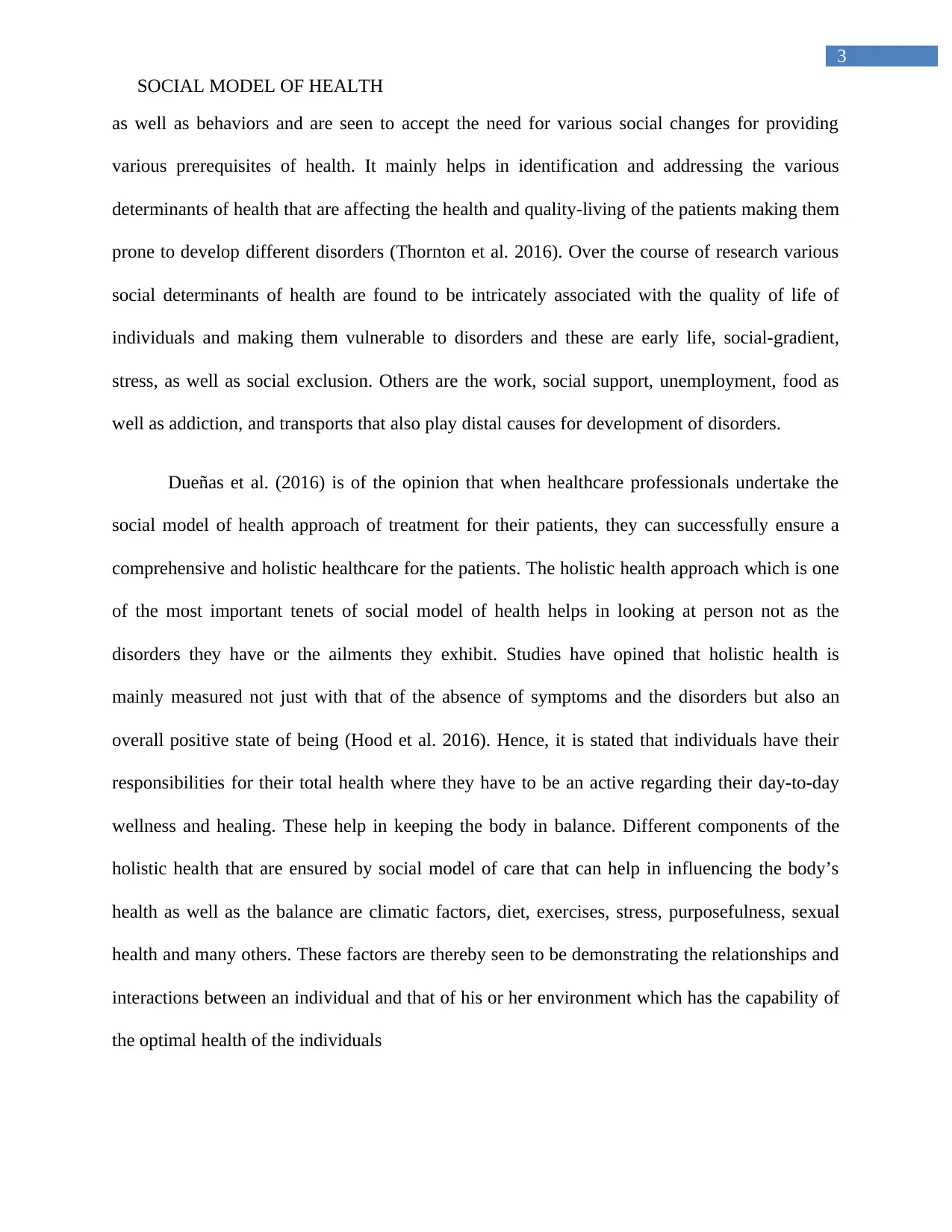
3
SOCIAL MODEL OF HEALTH
as well as behaviors and are seen to accept the need for various social changes for providing
various prerequisites of health. It mainly helps in identification and addressing the various
determinants of health that are affecting the health and quality-living of the patients making them
prone to develop different disorders (Thornton et al. 2016). Over the course of research various
social determinants of health are found to be intricately associated with the quality of life of
individuals and making them vulnerable to disorders and these are early life, social-gradient,
stress, as well as social exclusion. Others are the work, social support, unemployment, food as
well as addiction, and transports that also play distal causes for development of disorders.
Dueñas et al. (2016) is of the opinion that when healthcare professionals undertake the
social model of health approach of treatment for their patients, they can successfully ensure a
comprehensive and holistic healthcare for the patients. The holistic health approach which is one
of the most important tenets of social model of health helps in looking at person not as the
disorders they have or the ailments they exhibit. Studies have opined that holistic health is
mainly measured not just with that of the absence of symptoms and the disorders but also an
overall positive state of being (Hood et al. 2016). Hence, it is stated that individuals have their
responsibilities for their total health where they have to be an active regarding their day-to-day
wellness and healing. These help in keeping the body in balance. Different components of the
holistic health that are ensured by social model of care that can help in influencing the body’s
health as well as the balance are climatic factors, diet, exercises, stress, purposefulness, sexual
health and many others. These factors are thereby seen to be demonstrating the relationships and
interactions between an individual and that of his or her environment which has the capability of
the optimal health of the individuals
SOCIAL MODEL OF HEALTH
as well as behaviors and are seen to accept the need for various social changes for providing
various prerequisites of health. It mainly helps in identification and addressing the various
determinants of health that are affecting the health and quality-living of the patients making them
prone to develop different disorders (Thornton et al. 2016). Over the course of research various
social determinants of health are found to be intricately associated with the quality of life of
individuals and making them vulnerable to disorders and these are early life, social-gradient,
stress, as well as social exclusion. Others are the work, social support, unemployment, food as
well as addiction, and transports that also play distal causes for development of disorders.
Dueñas et al. (2016) is of the opinion that when healthcare professionals undertake the
social model of health approach of treatment for their patients, they can successfully ensure a
comprehensive and holistic healthcare for the patients. The holistic health approach which is one
of the most important tenets of social model of health helps in looking at person not as the
disorders they have or the ailments they exhibit. Studies have opined that holistic health is
mainly measured not just with that of the absence of symptoms and the disorders but also an
overall positive state of being (Hood et al. 2016). Hence, it is stated that individuals have their
responsibilities for their total health where they have to be an active regarding their day-to-day
wellness and healing. These help in keeping the body in balance. Different components of the
holistic health that are ensured by social model of care that can help in influencing the body’s
health as well as the balance are climatic factors, diet, exercises, stress, purposefulness, sexual
health and many others. These factors are thereby seen to be demonstrating the relationships and
interactions between an individual and that of his or her environment which has the capability of
the optimal health of the individuals
Paraphrase This Document
Need a fresh take? Get an instant paraphrase of this document with our AI Paraphraser
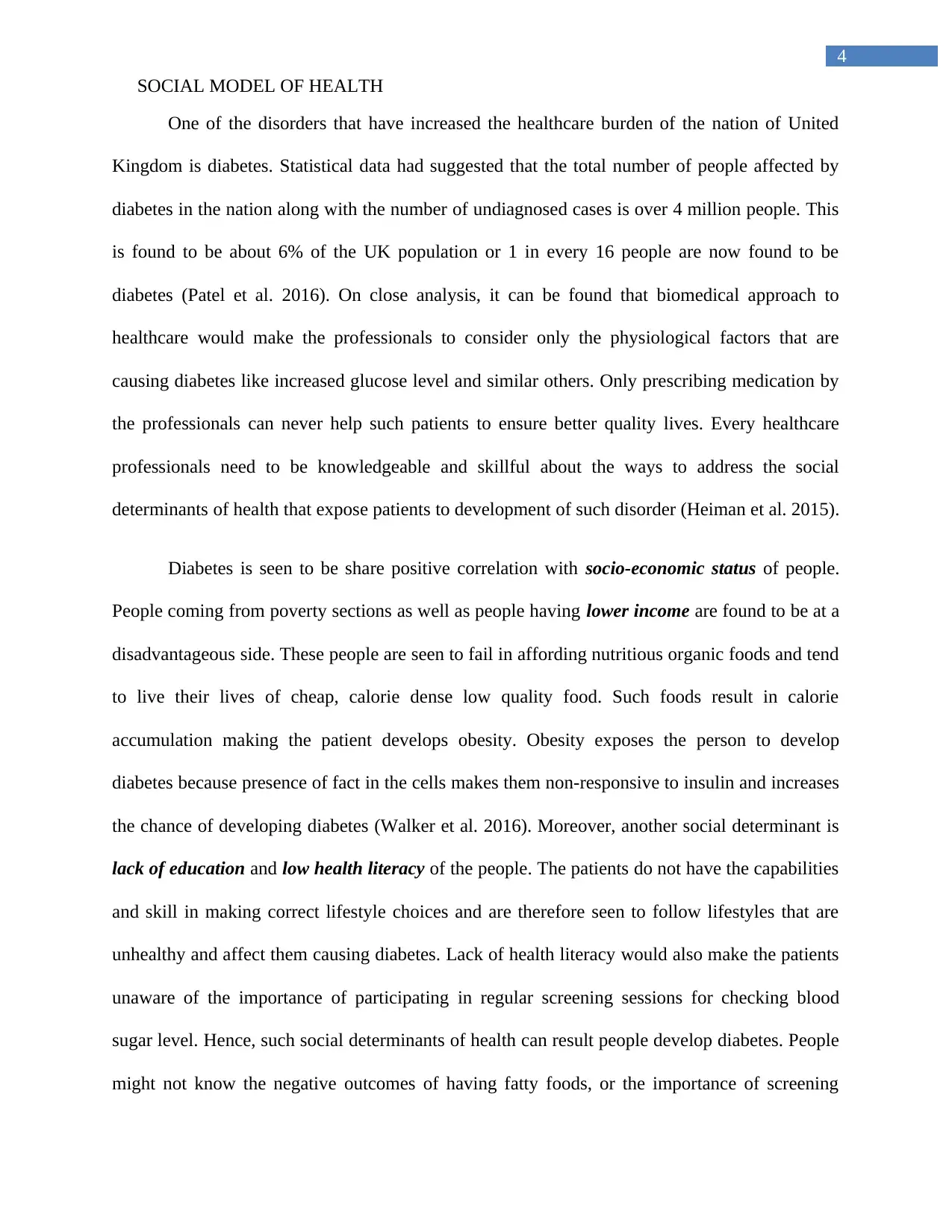
4
SOCIAL MODEL OF HEALTH
One of the disorders that have increased the healthcare burden of the nation of United
Kingdom is diabetes. Statistical data had suggested that the total number of people affected by
diabetes in the nation along with the number of undiagnosed cases is over 4 million people. This
is found to be about 6% of the UK population or 1 in every 16 people are now found to be
diabetes (Patel et al. 2016). On close analysis, it can be found that biomedical approach to
healthcare would make the professionals to consider only the physiological factors that are
causing diabetes like increased glucose level and similar others. Only prescribing medication by
the professionals can never help such patients to ensure better quality lives. Every healthcare
professionals need to be knowledgeable and skillful about the ways to address the social
determinants of health that expose patients to development of such disorder (Heiman et al. 2015).
Diabetes is seen to be share positive correlation with socio-economic status of people.
People coming from poverty sections as well as people having lower income are found to be at a
disadvantageous side. These people are seen to fail in affording nutritious organic foods and tend
to live their lives of cheap, calorie dense low quality food. Such foods result in calorie
accumulation making the patient develops obesity. Obesity exposes the person to develop
diabetes because presence of fact in the cells makes them non-responsive to insulin and increases
the chance of developing diabetes (Walker et al. 2016). Moreover, another social determinant is
lack of education and low health literacy of the people. The patients do not have the capabilities
and skill in making correct lifestyle choices and are therefore seen to follow lifestyles that are
unhealthy and affect them causing diabetes. Lack of health literacy would also make the patients
unaware of the importance of participating in regular screening sessions for checking blood
sugar level. Hence, such social determinants of health can result people develop diabetes. People
might not know the negative outcomes of having fatty foods, or the importance of screening
SOCIAL MODEL OF HEALTH
One of the disorders that have increased the healthcare burden of the nation of United
Kingdom is diabetes. Statistical data had suggested that the total number of people affected by
diabetes in the nation along with the number of undiagnosed cases is over 4 million people. This
is found to be about 6% of the UK population or 1 in every 16 people are now found to be
diabetes (Patel et al. 2016). On close analysis, it can be found that biomedical approach to
healthcare would make the professionals to consider only the physiological factors that are
causing diabetes like increased glucose level and similar others. Only prescribing medication by
the professionals can never help such patients to ensure better quality lives. Every healthcare
professionals need to be knowledgeable and skillful about the ways to address the social
determinants of health that expose patients to development of such disorder (Heiman et al. 2015).
Diabetes is seen to be share positive correlation with socio-economic status of people.
People coming from poverty sections as well as people having lower income are found to be at a
disadvantageous side. These people are seen to fail in affording nutritious organic foods and tend
to live their lives of cheap, calorie dense low quality food. Such foods result in calorie
accumulation making the patient develops obesity. Obesity exposes the person to develop
diabetes because presence of fact in the cells makes them non-responsive to insulin and increases
the chance of developing diabetes (Walker et al. 2016). Moreover, another social determinant is
lack of education and low health literacy of the people. The patients do not have the capabilities
and skill in making correct lifestyle choices and are therefore seen to follow lifestyles that are
unhealthy and affect them causing diabetes. Lack of health literacy would also make the patients
unaware of the importance of participating in regular screening sessions for checking blood
sugar level. Hence, such social determinants of health can result people develop diabetes. People
might not know the negative outcomes of having fatty foods, or the importance of screening
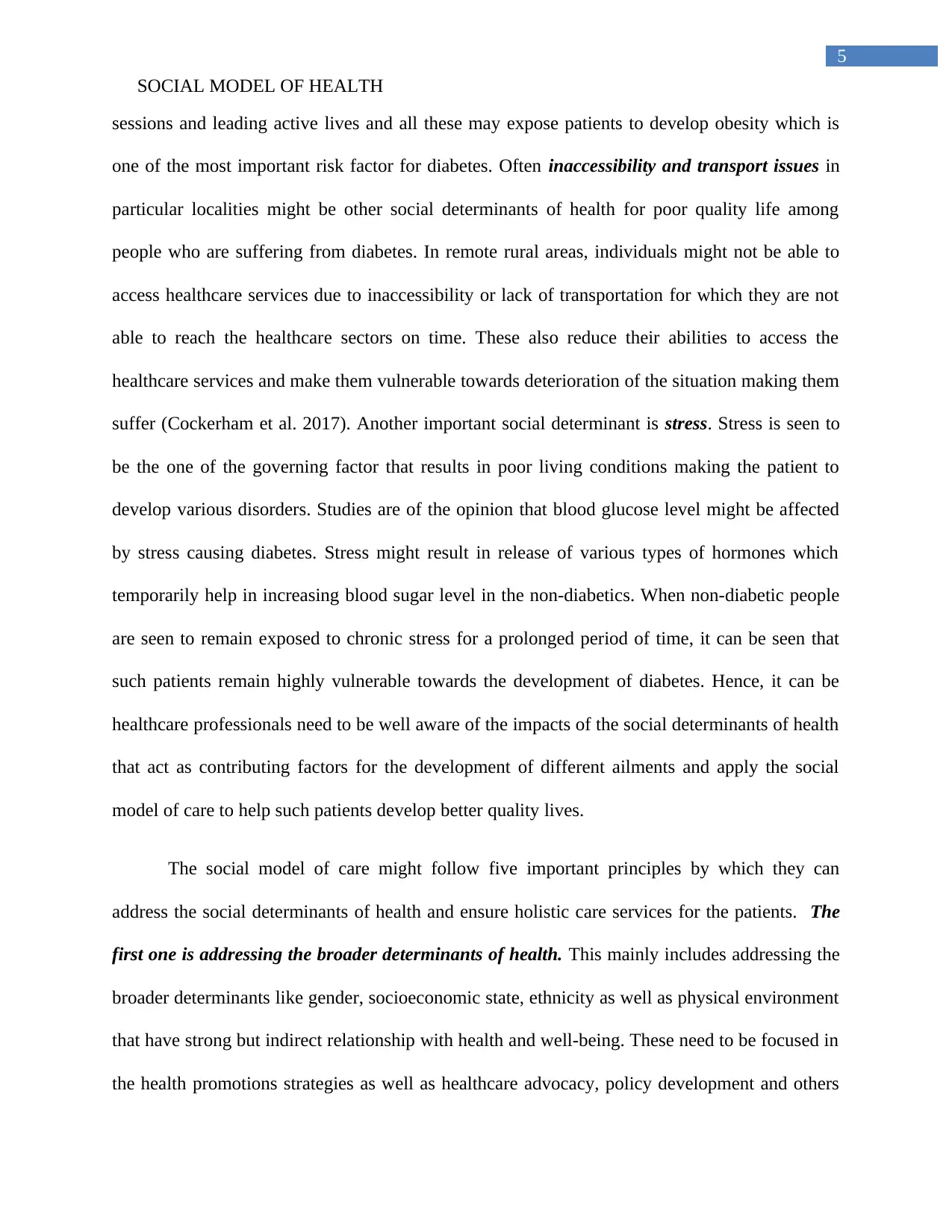
5
SOCIAL MODEL OF HEALTH
sessions and leading active lives and all these may expose patients to develop obesity which is
one of the most important risk factor for diabetes. Often inaccessibility and transport issues in
particular localities might be other social determinants of health for poor quality life among
people who are suffering from diabetes. In remote rural areas, individuals might not be able to
access healthcare services due to inaccessibility or lack of transportation for which they are not
able to reach the healthcare sectors on time. These also reduce their abilities to access the
healthcare services and make them vulnerable towards deterioration of the situation making them
suffer (Cockerham et al. 2017). Another important social determinant is stress. Stress is seen to
be the one of the governing factor that results in poor living conditions making the patient to
develop various disorders. Studies are of the opinion that blood glucose level might be affected
by stress causing diabetes. Stress might result in release of various types of hormones which
temporarily help in increasing blood sugar level in the non-diabetics. When non-diabetic people
are seen to remain exposed to chronic stress for a prolonged period of time, it can be seen that
such patients remain highly vulnerable towards the development of diabetes. Hence, it can be
healthcare professionals need to be well aware of the impacts of the social determinants of health
that act as contributing factors for the development of different ailments and apply the social
model of care to help such patients develop better quality lives.
The social model of care might follow five important principles by which they can
address the social determinants of health and ensure holistic care services for the patients. The
first one is addressing the broader determinants of health. This mainly includes addressing the
broader determinants like gender, socioeconomic state, ethnicity as well as physical environment
that have strong but indirect relationship with health and well-being. These need to be focused in
the health promotions strategies as well as healthcare advocacy, policy development and others
SOCIAL MODEL OF HEALTH
sessions and leading active lives and all these may expose patients to develop obesity which is
one of the most important risk factor for diabetes. Often inaccessibility and transport issues in
particular localities might be other social determinants of health for poor quality life among
people who are suffering from diabetes. In remote rural areas, individuals might not be able to
access healthcare services due to inaccessibility or lack of transportation for which they are not
able to reach the healthcare sectors on time. These also reduce their abilities to access the
healthcare services and make them vulnerable towards deterioration of the situation making them
suffer (Cockerham et al. 2017). Another important social determinant is stress. Stress is seen to
be the one of the governing factor that results in poor living conditions making the patient to
develop various disorders. Studies are of the opinion that blood glucose level might be affected
by stress causing diabetes. Stress might result in release of various types of hormones which
temporarily help in increasing blood sugar level in the non-diabetics. When non-diabetic people
are seen to remain exposed to chronic stress for a prolonged period of time, it can be seen that
such patients remain highly vulnerable towards the development of diabetes. Hence, it can be
healthcare professionals need to be well aware of the impacts of the social determinants of health
that act as contributing factors for the development of different ailments and apply the social
model of care to help such patients develop better quality lives.
The social model of care might follow five important principles by which they can
address the social determinants of health and ensure holistic care services for the patients. The
first one is addressing the broader determinants of health. This mainly includes addressing the
broader determinants like gender, socioeconomic state, ethnicity as well as physical environment
that have strong but indirect relationship with health and well-being. These need to be focused in
the health promotions strategies as well as healthcare advocacy, policy development and others
⊘ This is a preview!⊘
Do you want full access?
Subscribe today to unlock all pages.

Trusted by 1+ million students worldwide
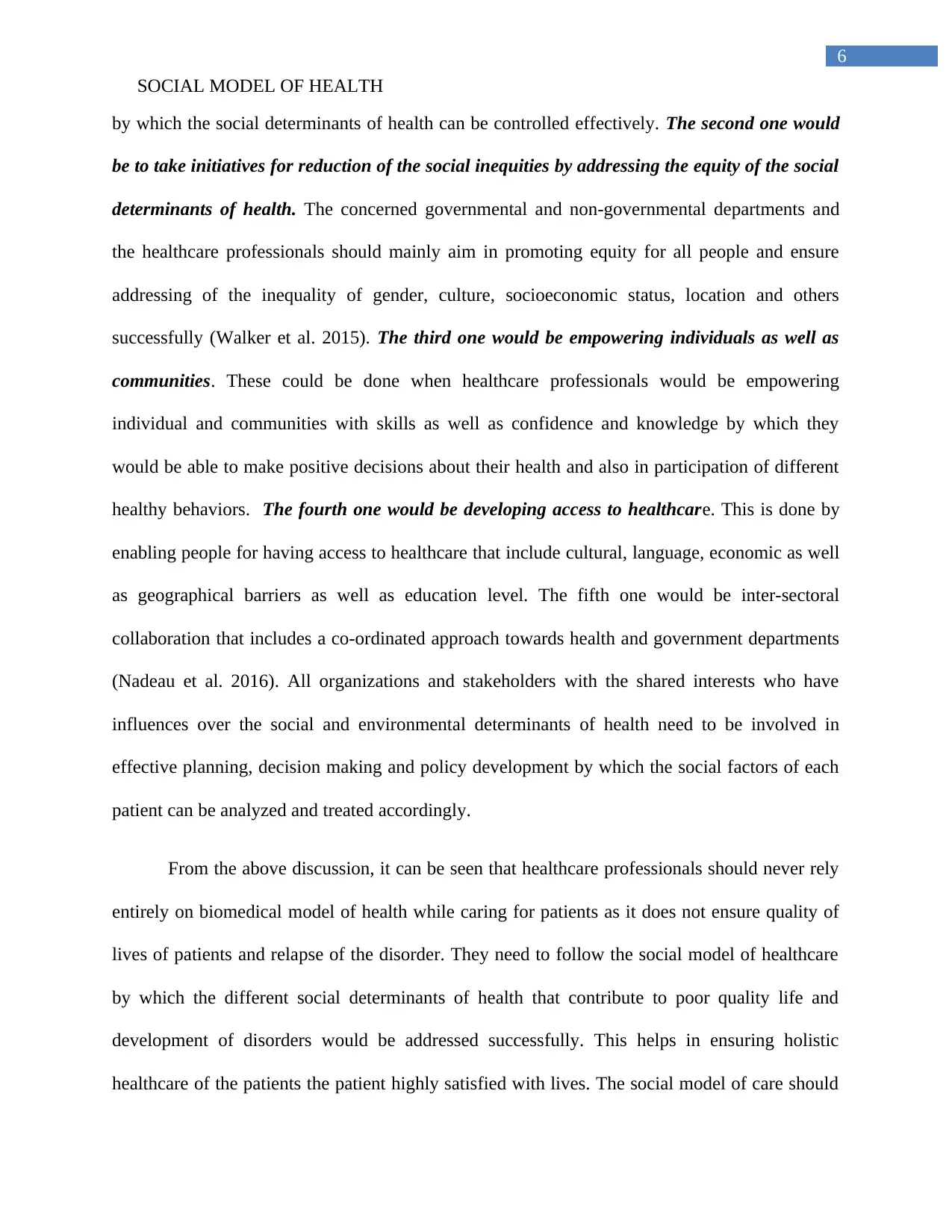
6
SOCIAL MODEL OF HEALTH
by which the social determinants of health can be controlled effectively. The second one would
be to take initiatives for reduction of the social inequities by addressing the equity of the social
determinants of health. The concerned governmental and non-governmental departments and
the healthcare professionals should mainly aim in promoting equity for all people and ensure
addressing of the inequality of gender, culture, socioeconomic status, location and others
successfully (Walker et al. 2015). The third one would be empowering individuals as well as
communities. These could be done when healthcare professionals would be empowering
individual and communities with skills as well as confidence and knowledge by which they
would be able to make positive decisions about their health and also in participation of different
healthy behaviors. The fourth one would be developing access to healthcare. This is done by
enabling people for having access to healthcare that include cultural, language, economic as well
as geographical barriers as well as education level. The fifth one would be inter-sectoral
collaboration that includes a co-ordinated approach towards health and government departments
(Nadeau et al. 2016). All organizations and stakeholders with the shared interests who have
influences over the social and environmental determinants of health need to be involved in
effective planning, decision making and policy development by which the social factors of each
patient can be analyzed and treated accordingly.
From the above discussion, it can be seen that healthcare professionals should never rely
entirely on biomedical model of health while caring for patients as it does not ensure quality of
lives of patients and relapse of the disorder. They need to follow the social model of healthcare
by which the different social determinants of health that contribute to poor quality life and
development of disorders would be addressed successfully. This helps in ensuring holistic
healthcare of the patients the patient highly satisfied with lives. The social model of care should
SOCIAL MODEL OF HEALTH
by which the social determinants of health can be controlled effectively. The second one would
be to take initiatives for reduction of the social inequities by addressing the equity of the social
determinants of health. The concerned governmental and non-governmental departments and
the healthcare professionals should mainly aim in promoting equity for all people and ensure
addressing of the inequality of gender, culture, socioeconomic status, location and others
successfully (Walker et al. 2015). The third one would be empowering individuals as well as
communities. These could be done when healthcare professionals would be empowering
individual and communities with skills as well as confidence and knowledge by which they
would be able to make positive decisions about their health and also in participation of different
healthy behaviors. The fourth one would be developing access to healthcare. This is done by
enabling people for having access to healthcare that include cultural, language, economic as well
as geographical barriers as well as education level. The fifth one would be inter-sectoral
collaboration that includes a co-ordinated approach towards health and government departments
(Nadeau et al. 2016). All organizations and stakeholders with the shared interests who have
influences over the social and environmental determinants of health need to be involved in
effective planning, decision making and policy development by which the social factors of each
patient can be analyzed and treated accordingly.
From the above discussion, it can be seen that healthcare professionals should never rely
entirely on biomedical model of health while caring for patients as it does not ensure quality of
lives of patients and relapse of the disorder. They need to follow the social model of healthcare
by which the different social determinants of health that contribute to poor quality life and
development of disorders would be addressed successfully. This helps in ensuring holistic
healthcare of the patients the patient highly satisfied with lives. The social model of care should
Paraphrase This Document
Need a fresh take? Get an instant paraphrase of this document with our AI Paraphraser
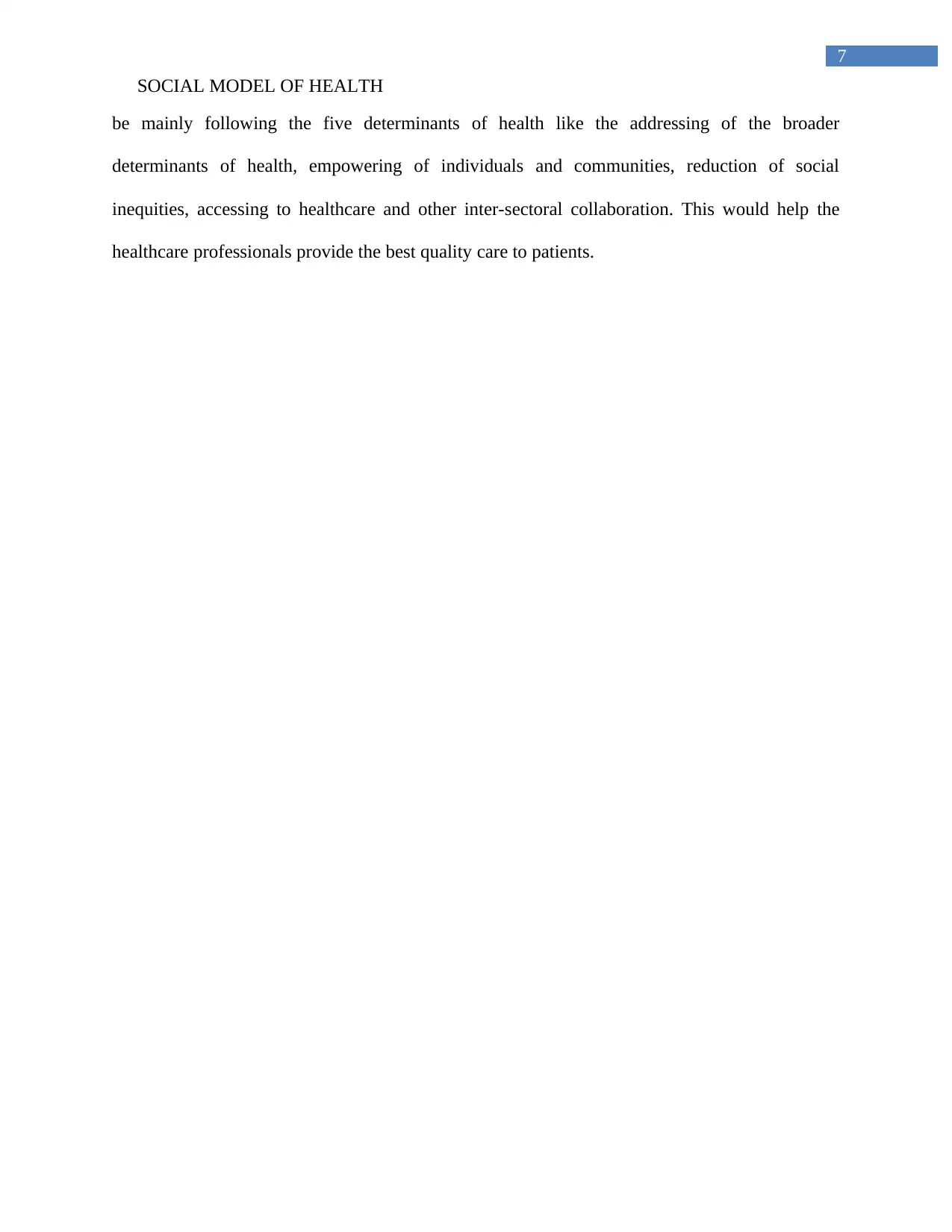
7
SOCIAL MODEL OF HEALTH
be mainly following the five determinants of health like the addressing of the broader
determinants of health, empowering of individuals and communities, reduction of social
inequities, accessing to healthcare and other inter-sectoral collaboration. This would help the
healthcare professionals provide the best quality care to patients.
SOCIAL MODEL OF HEALTH
be mainly following the five determinants of health like the addressing of the broader
determinants of health, empowering of individuals and communities, reduction of social
inequities, accessing to healthcare and other inter-sectoral collaboration. This would help the
healthcare professionals provide the best quality care to patients.
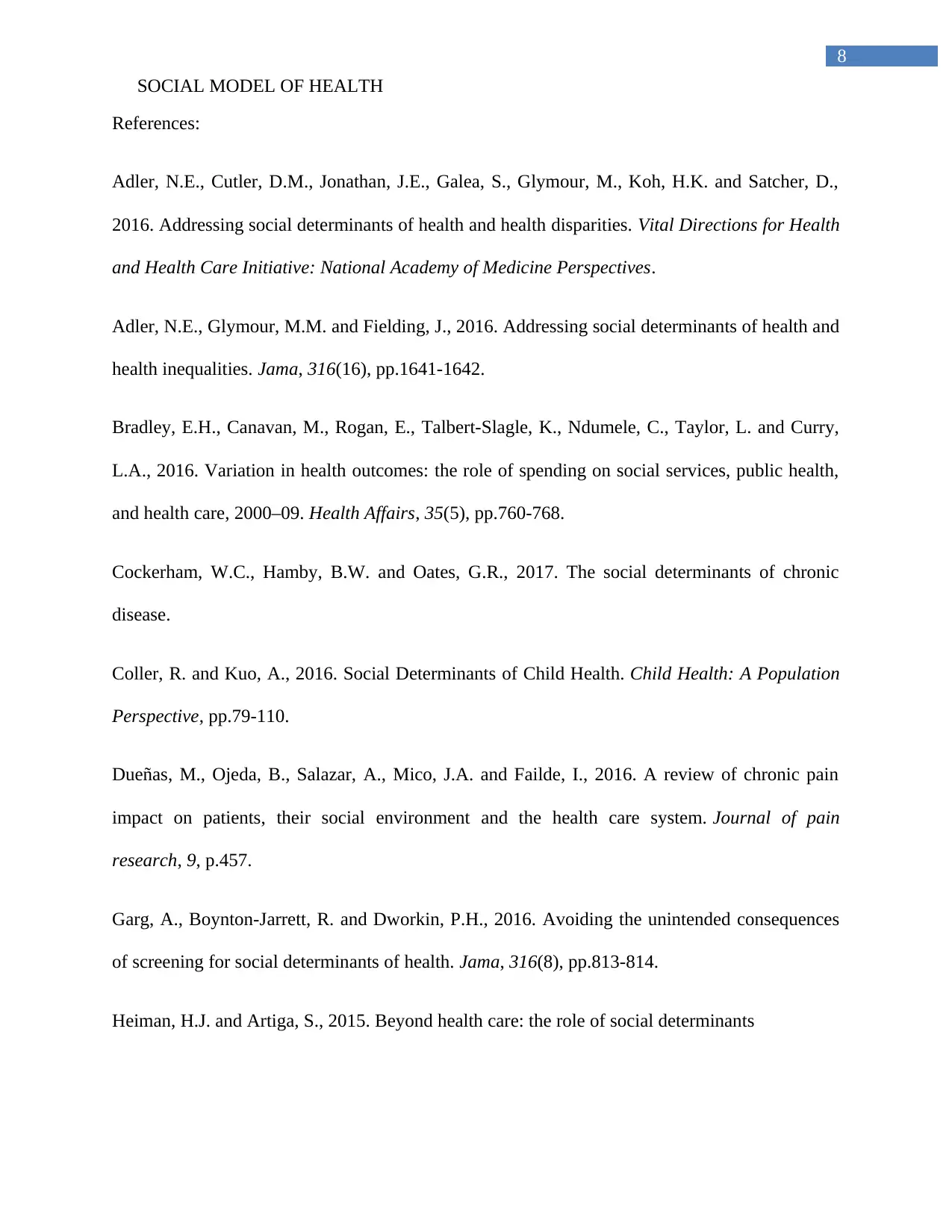
8
SOCIAL MODEL OF HEALTH
References:
Adler, N.E., Cutler, D.M., Jonathan, J.E., Galea, S., Glymour, M., Koh, H.K. and Satcher, D.,
2016. Addressing social determinants of health and health disparities. Vital Directions for Health
and Health Care Initiative: National Academy of Medicine Perspectives.
Adler, N.E., Glymour, M.M. and Fielding, J., 2016. Addressing social determinants of health and
health inequalities. Jama, 316(16), pp.1641-1642.
Bradley, E.H., Canavan, M., Rogan, E., Talbert-Slagle, K., Ndumele, C., Taylor, L. and Curry,
L.A., 2016. Variation in health outcomes: the role of spending on social services, public health,
and health care, 2000–09. Health Affairs, 35(5), pp.760-768.
Cockerham, W.C., Hamby, B.W. and Oates, G.R., 2017. The social determinants of chronic
disease.
Coller, R. and Kuo, A., 2016. Social Determinants of Child Health. Child Health: A Population
Perspective, pp.79-110.
Dueñas, M., Ojeda, B., Salazar, A., Mico, J.A. and Failde, I., 2016. A review of chronic pain
impact on patients, their social environment and the health care system. Journal of pain
research, 9, p.457.
Garg, A., Boynton-Jarrett, R. and Dworkin, P.H., 2016. Avoiding the unintended consequences
of screening for social determinants of health. Jama, 316(8), pp.813-814.
Heiman, H.J. and Artiga, S., 2015. Beyond health care: the role of social determinants
SOCIAL MODEL OF HEALTH
References:
Adler, N.E., Cutler, D.M., Jonathan, J.E., Galea, S., Glymour, M., Koh, H.K. and Satcher, D.,
2016. Addressing social determinants of health and health disparities. Vital Directions for Health
and Health Care Initiative: National Academy of Medicine Perspectives.
Adler, N.E., Glymour, M.M. and Fielding, J., 2016. Addressing social determinants of health and
health inequalities. Jama, 316(16), pp.1641-1642.
Bradley, E.H., Canavan, M., Rogan, E., Talbert-Slagle, K., Ndumele, C., Taylor, L. and Curry,
L.A., 2016. Variation in health outcomes: the role of spending on social services, public health,
and health care, 2000–09. Health Affairs, 35(5), pp.760-768.
Cockerham, W.C., Hamby, B.W. and Oates, G.R., 2017. The social determinants of chronic
disease.
Coller, R. and Kuo, A., 2016. Social Determinants of Child Health. Child Health: A Population
Perspective, pp.79-110.
Dueñas, M., Ojeda, B., Salazar, A., Mico, J.A. and Failde, I., 2016. A review of chronic pain
impact on patients, their social environment and the health care system. Journal of pain
research, 9, p.457.
Garg, A., Boynton-Jarrett, R. and Dworkin, P.H., 2016. Avoiding the unintended consequences
of screening for social determinants of health. Jama, 316(8), pp.813-814.
Heiman, H.J. and Artiga, S., 2015. Beyond health care: the role of social determinants
⊘ This is a preview!⊘
Do you want full access?
Subscribe today to unlock all pages.

Trusted by 1+ million students worldwide
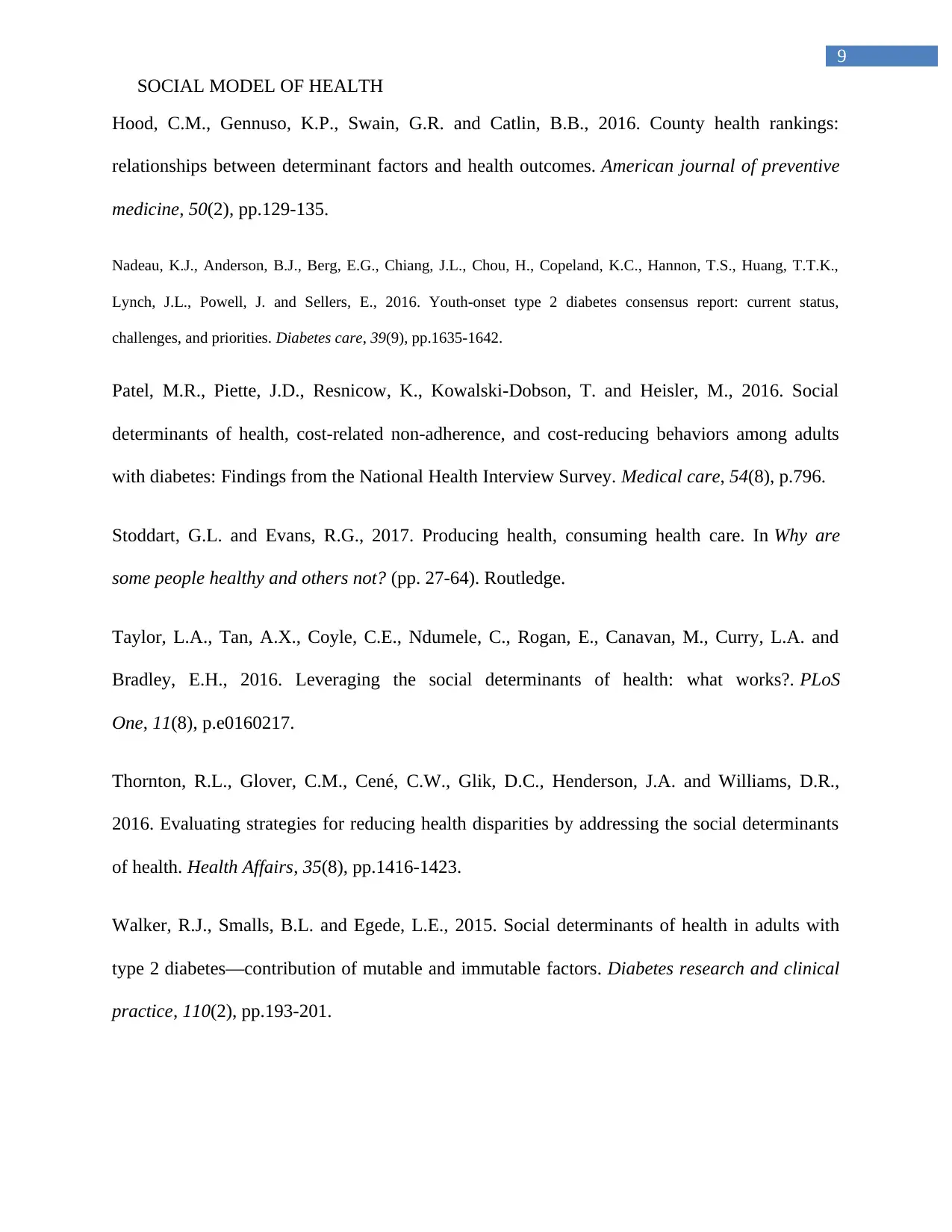
9
SOCIAL MODEL OF HEALTH
Hood, C.M., Gennuso, K.P., Swain, G.R. and Catlin, B.B., 2016. County health rankings:
relationships between determinant factors and health outcomes. American journal of preventive
medicine, 50(2), pp.129-135.
Nadeau, K.J., Anderson, B.J., Berg, E.G., Chiang, J.L., Chou, H., Copeland, K.C., Hannon, T.S., Huang, T.T.K.,
Lynch, J.L., Powell, J. and Sellers, E., 2016. Youth-onset type 2 diabetes consensus report: current status,
challenges, and priorities. Diabetes care, 39(9), pp.1635-1642.
Patel, M.R., Piette, J.D., Resnicow, K., Kowalski-Dobson, T. and Heisler, M., 2016. Social
determinants of health, cost-related non-adherence, and cost-reducing behaviors among adults
with diabetes: Findings from the National Health Interview Survey. Medical care, 54(8), p.796.
Stoddart, G.L. and Evans, R.G., 2017. Producing health, consuming health care. In Why are
some people healthy and others not? (pp. 27-64). Routledge.
Taylor, L.A., Tan, A.X., Coyle, C.E., Ndumele, C., Rogan, E., Canavan, M., Curry, L.A. and
Bradley, E.H., 2016. Leveraging the social determinants of health: what works?. PLoS
One, 11(8), p.e0160217.
Thornton, R.L., Glover, C.M., Cené, C.W., Glik, D.C., Henderson, J.A. and Williams, D.R.,
2016. Evaluating strategies for reducing health disparities by addressing the social determinants
of health. Health Affairs, 35(8), pp.1416-1423.
Walker, R.J., Smalls, B.L. and Egede, L.E., 2015. Social determinants of health in adults with
type 2 diabetes—contribution of mutable and immutable factors. Diabetes research and clinical
practice, 110(2), pp.193-201.
SOCIAL MODEL OF HEALTH
Hood, C.M., Gennuso, K.P., Swain, G.R. and Catlin, B.B., 2016. County health rankings:
relationships between determinant factors and health outcomes. American journal of preventive
medicine, 50(2), pp.129-135.
Nadeau, K.J., Anderson, B.J., Berg, E.G., Chiang, J.L., Chou, H., Copeland, K.C., Hannon, T.S., Huang, T.T.K.,
Lynch, J.L., Powell, J. and Sellers, E., 2016. Youth-onset type 2 diabetes consensus report: current status,
challenges, and priorities. Diabetes care, 39(9), pp.1635-1642.
Patel, M.R., Piette, J.D., Resnicow, K., Kowalski-Dobson, T. and Heisler, M., 2016. Social
determinants of health, cost-related non-adherence, and cost-reducing behaviors among adults
with diabetes: Findings from the National Health Interview Survey. Medical care, 54(8), p.796.
Stoddart, G.L. and Evans, R.G., 2017. Producing health, consuming health care. In Why are
some people healthy and others not? (pp. 27-64). Routledge.
Taylor, L.A., Tan, A.X., Coyle, C.E., Ndumele, C., Rogan, E., Canavan, M., Curry, L.A. and
Bradley, E.H., 2016. Leveraging the social determinants of health: what works?. PLoS
One, 11(8), p.e0160217.
Thornton, R.L., Glover, C.M., Cené, C.W., Glik, D.C., Henderson, J.A. and Williams, D.R.,
2016. Evaluating strategies for reducing health disparities by addressing the social determinants
of health. Health Affairs, 35(8), pp.1416-1423.
Walker, R.J., Smalls, B.L. and Egede, L.E., 2015. Social determinants of health in adults with
type 2 diabetes—contribution of mutable and immutable factors. Diabetes research and clinical
practice, 110(2), pp.193-201.
Paraphrase This Document
Need a fresh take? Get an instant paraphrase of this document with our AI Paraphraser
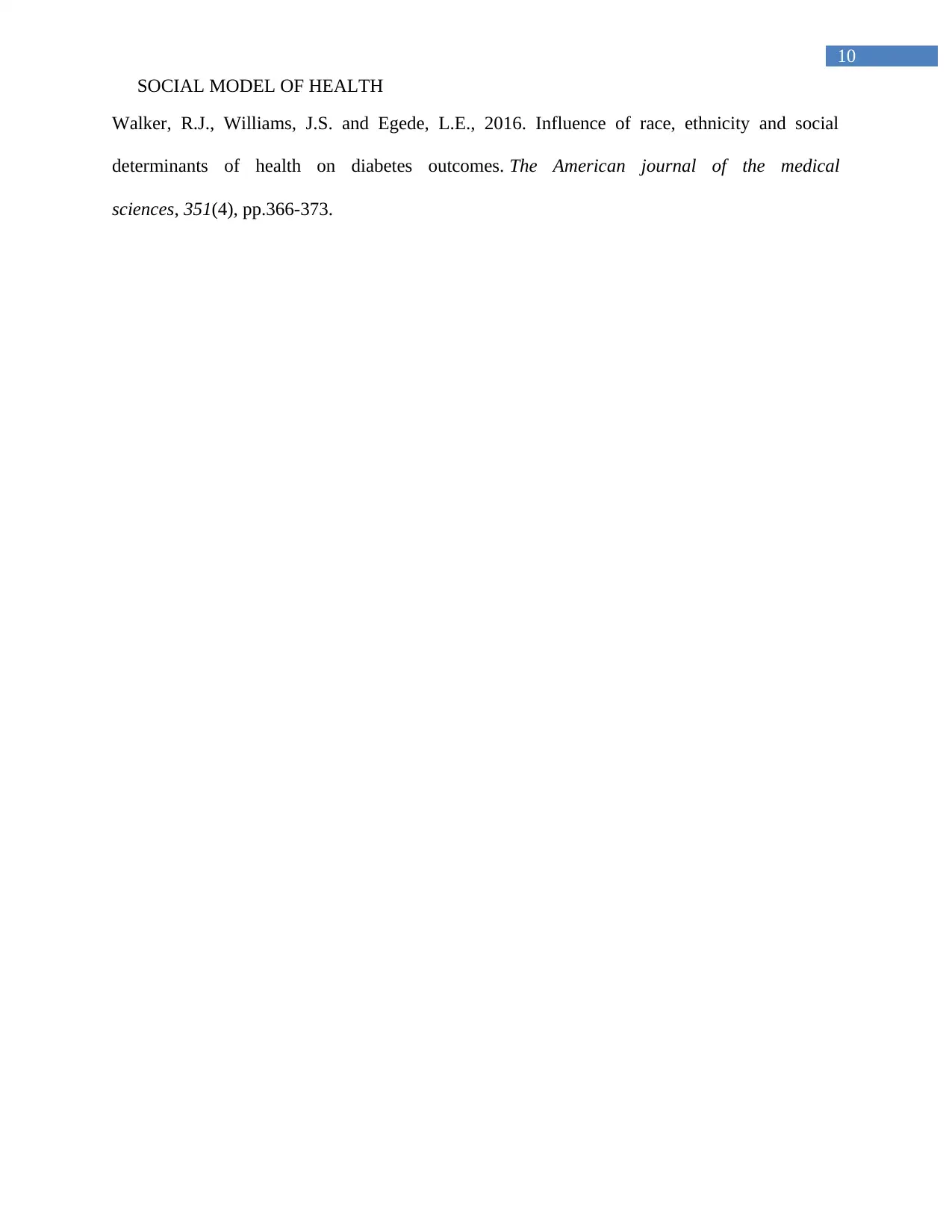
10
SOCIAL MODEL OF HEALTH
Walker, R.J., Williams, J.S. and Egede, L.E., 2016. Influence of race, ethnicity and social
determinants of health on diabetes outcomes. The American journal of the medical
sciences, 351(4), pp.366-373.
SOCIAL MODEL OF HEALTH
Walker, R.J., Williams, J.S. and Egede, L.E., 2016. Influence of race, ethnicity and social
determinants of health on diabetes outcomes. The American journal of the medical
sciences, 351(4), pp.366-373.
1 out of 11
Related Documents
Your All-in-One AI-Powered Toolkit for Academic Success.
+13062052269
info@desklib.com
Available 24*7 on WhatsApp / Email
![[object Object]](/_next/static/media/star-bottom.7253800d.svg)
Unlock your academic potential
Copyright © 2020–2025 A2Z Services. All Rights Reserved. Developed and managed by ZUCOL.





